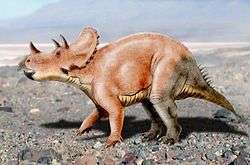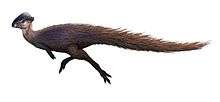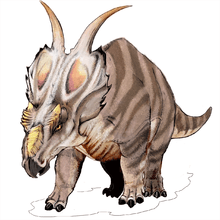Tatankaceratops
| Tatankaceratops Temporal range: Late Maastrichtian, 66 Ma | |
|---|---|
 | |
| Artist's restoration of Tatankaceratops | |
| Scientific classification | |
| Kingdom: | Animalia |
| Phylum: | Chordata |
| Class: | Reptilia |
| Clade: | Dinosauria |
| Order: | †Ornithischia |
| Family: | †Ceratopsidae |
| Subfamily: | †Chasmosaurinae |
| Genus: | †Tatankaceratops Ott & Larson, 2010 |
| Species: | †T. sacrisonorum |
| Binomial name | |
| Tatankaceratops sacrisonorum Ott & Larson, 2010 | |
Tatankaceratops (meaning "Bison horn face") is a controversial genus of herbivorous ceratopsian dinosaur. It is a small chasmosaurine ceratopsian which lived during the Late Cretaceous period (latest Maastrichtian stage) in what is now South Dakota. It is known from a single partial skull which was collected from the Hell Creek Formation, dating to 66 million years ago. Tatankaceratops was described by Christopher J. Ott and Peter L. Larson in 2010 and the type species is Tatankaceratops sacrisonorum.[1]
In 2011, Nick Longrich published a paper containing a brief re-evaluation of Tatankaceratops. Longrich suggested that Tatankaceratops appeared to possess a bizarre mix of characteristics from adult and juvenile Triceratops specimens. Longrich noted that this animal could represent a dwarf Triceratops species or simply a Triceratops specimen with a developmental disorder which caused it to stop growing prematurely.[2] Other paleontologists, including Thomas R. Holtz, Jr., have written that they "strongly suspect" Tatankaceratops is merely a juvenile specimen of Triceratops.[3]
See also
References
- ↑ Christopher J. Ott and Peter L. Larson, 2010, "A New, Small Ceratopsian Dinosaur from the Latest Cretaceous Hell Creek Formation, Northwest South Dakota, United States: A Preliminary Description", In: Ryan, M.J., Chinnery-Allgeier, B.J., and Eberth, D.A. (eds.) New Perspectives on Horned Dinosaurs: The Royal Tyrrell Museum Ceratopsian Symposium, Bloomington, Indiana University Press, 656 pp.
- ↑ Nicholas R. Longrich (2011). "Titanoceratops ouranos, a giant horned dinosaur from the Late Campanian of New Mexico". Cretaceous Research. 32 (3): 264–276. doi:10.1016/j.cretres.2010.12.007.
- ↑ Holtz, Thomas R. Jr. (2011) Dinosaurs: The Most Complete, Up-to-Date Encyclopedia for Dinosaur Lovers of All Ages, Winter 2010 Appendix.


